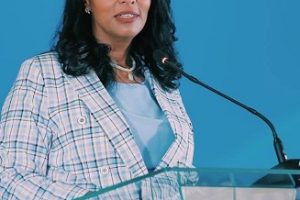
Ethiopia continues to pursue a diplomatic approach that aims for long-term stability and cooperation, as emphasized by the Ethiopian Minister of Foreign Affairs. He stated, “Ethiopia will follow a diplomatic path that transcends the rhetoric of neighboring countries.”
In a recent weekly briefing, Ambassador Nebiyat Getachew, the spokesperson for the Ministry of Foreign Affairs, reiterated this sentiment, emphasizing that Ethiopia remains committed to diplomacy without being distracted by fleeting tensions or exchanges with neighboring nations. His remarks were particularly relevant in light of Eritrean President Isaias Afwerki’s criticism of Ethiopia during the 34th Eritrean Independence Day on May 24.
Ambassador Getachew highlighted that a core component of Ethiopia’s foreign relations is fostering collaboration with neighboring countries to ensure peace and stability. He acknowledged that, historically, leaders from neighboring nations have made various accusations against Ethiopia, yet the country has remained calm and composed. He emphasized that Ethiopia is committed to a diplomatic journey grounded in peace, without getting entangled in transient disputes.
In the context of East African politics, it is clear that peace requires collective efforts rather than isolation. The people of East Africa are eager for stability, progress, and freedom, rejecting any form of bloodshed or oppression. Dr. Dareskedar Taye, a researcher at the Institute of Foreign Affairs, noted that a century of lack of cooperation has fostered suspicion among neighboring countries.
He argued that utilizing shared resources, such as ports and rivers, effectively can create economic ties, reduce costs, and enhance cooperation in a region marked by poverty.
Regarding Egypt, Dr. Dareskedar pointed out that Cairo has often acted against Ethiopia’s interests, particularly when it perceives political instability in Ethiopia. This rivalry has historical roots, dating back to the old times, with the Nile River serving as a focal point for competition over cultural, religious, and historical dominance.
Dr. Worku Yaqob, Executive Director of Interaction for Change in Africa, expressed that the interests of Western powers and Arab nations complicate regional dynamics. He emphasized the importance of Ethiopia securing its own port facilities, particularly in light of its large population. However, he acknowledged that such measures could lead to conflicts due to the vested interests of regional powers, especially Egypt.
Dr. Worku underscored that safeguarding national interests involves navigating complex foreign policy challenges. He stressed the need for Ethiopia to prepare thoroughly to articulate and defend its position in the face of potential conflicts. This preparation includes building strong diplomatic relations with countries and organizations that share Ethiopia’s perspective.
Dr. Dareskedar further noted that foreign powers often increase their influence when internal peace is threatened, highlighting the necessity for the Ethiopian government to strengthen internal stability and uphold the rule of law.
The issue of port access is crucial for Ethiopia’s national interests. The country should explore options that protect its sovereignty without resorting to conflict. It is essential to move past the divisive narratives perpetuated by stubborn politicians and military leaders. The Ministry of Foreign Affairs’ statement emphasizing Ethiopia’s focus on sustainable development over conspiracy-driven conflicts is both appropriate and timely.
Ethiopia’s diplomatic journey, characterized by resilience and a commitment to peace, reflects its determination to foster a stable and prosperous future in the region. Through collaborative efforts and strategic diplomacy, Ethiopia aims to navigate the complexities of international relations while prioritizing the well-being of its people.
It is fitting to remove from the game while providing substantial and valid reason. We are witnessing the unjust practices observed in the northern part of our country in my view it represents a cruel denial of the people’s rights, as those responsible seek to exploit these situations for their own malicious purposes. Therefore, it is more appropriate to remain silent and address these issues at the level of foreign affairs.
BY MENGISTEAB TESHOME
THE ETHIOPIAN HERALD SATURDAY 31 MAY 2025




